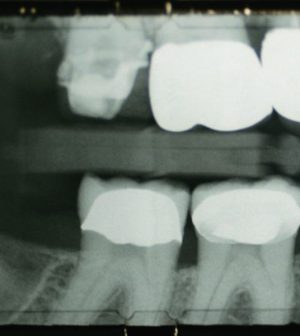- Could Your Grocery Store Meat Be Causing Recurring UTIs?
- Are You Making This Expensive Thermostat Error This Winter?
- Recognizing the Signs of Hypothyroidism
- 10 Strategies to Overcome Insomnia
- Could Artificial Sweeteners Be Aging the Brain Faster?
- Techniques for Soothing Your Nervous System
- Does the Water in Your House Smell Funny? Here’s Why
- Can a Daily Dose of Apple Cider Vinegar Actually Aid Weight Loss?
- 6 Health Beverages That Can Actually Spike Your Blood Sugar
- Treatment Options for Social Anxiety Disorder
PTSD Triples Odds for Teeth Grinding, Study Finds

People with post-traumatic stress disorder (PTSD) face more than triple the odds of bruxism, otherwise known as teeth grinding, a new study finds.
The small study of 76 Brazilian adults (38 diagnosed with PTSD and 38 without the condition) found much higher incidence of daytime teeth grinding.
“Our study showed that PTSD can be manifested orally, in bruxism and a higher level of pain after a clinical dental examination. This requires joint action by psychiatrists, psychologists and dentists in screening and treatment of both health conditions,” said study lead author Dr. Ana Cristina de Oliveira Solis of the University of Sao Paulo.
The findings were published recently in the journal Clinical Oral Investigations.
According to background information supplied by the researchers, it’s thought that between 8% and 30% of people habitually grind their teeth during waking hours.
While it’s well known that PTSD can manifest in psychological ways, such as flashbacks, nightmares, sleeplessness and self-destructive behaviors, there’s been little study of its effect on oral health, the researchers said.
Everyone in the study underwent an examination to determine the health of their teeth and gums.
“Oral hygiene was not found to be associated with the problem,” Solis said in a journal news release. “Periodontal examination, which included measurement of bacterial plaque and gingival bleeding [or bleeding on probing], showed that patients with PTSD and controls had a similar level of oral health. However, the PTSD patients presented with more pain after probing.”
That could mean that bruxism and heightened dental pain could be warning signs of an underlying psychiatric issue such as PTSD, the team said.
“For this reason, psychiatric screening instruments should be used in routine patient care, and patients should be advised to seek therapeutic assistance,” Solis said.
Alternatively, psychiatrists who diagnose a patient with PTSD might want to advise them to see a dentist if conditions like bruxism or jaw pain arise, she added.
More information
Find out more about bruxism at Johns Hopkins Medicine.
SOURCE: Springer publishing, news release, May 14, 2024
Source: HealthDay
Copyright © 2026 HealthDay. All rights reserved.










